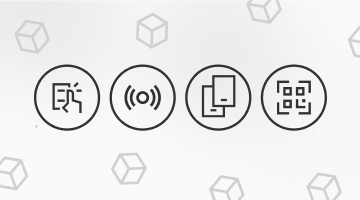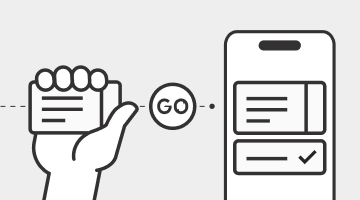Overview
MATTR Mobile Credentials are digital identity documents designed to be issued to, stored in, and presented from a digital wallet on the holder’s mobile device.
But they are so much more than that.
As the latest addition to the MATTR Credential Profiles offering, MATTR Mobile Credentials unlock a step-change in the power and utility of MATTR’s digital trust platforms and products. They provide the capabilities to enable in-person presentation and verification of personal identity data and/or entitlements using mobile devices to achieve high trust interactions.
For example, MATTR Mobile Credentials can be used to replace or complement physical copies of driver’s licenses, national ID cards, student ID cards, membership cards, payment cards and virtually any other physical form of credential.
MATTR Mobile Credentials work by packaging the credential data together with the security and authentication mechanisms needed to complete a secure credentials verification interaction directly between parties through their mobile devices, typically over a Bluetooth connection. Completing an interaction between a credential holder and a verifier, such as in the case of a police officer verifying a motorist’s digital driving license, does not require access to a remote server so can be completed independent of any mobile network connection.
MATTR Mobile Credentials harnesses the ubiquity of mobile devices and burgeoning demand from users for the convenience of managing more of their daily interactions through their smartphone to drive adoption and value. They enable scheme and ecosystem operators to significantly lift trust levels, reduce risks and costs and improve customer experiences and satisfaction across interactions that utilise the credentials they issue. For verifiers who are relying on credentials, there is the opportunity to limit the request for information to the data directly relevant to the interaction, supporting privacy and data minimisation whilst maintaining high assurance interactions.
MATTR Mobile Credentials are based on ISO/IEC standards and technical specifications, including ISO/IEC 18013 which facilitates driving license functionality on a mobile device, otherwise known as mDL, and ISO/IEC 23220 which supports many other forms of secure Electronic ID applications (eID-Apps) on mobile devices, generally referred to as mdoc apps.
MATTR’s deep involvement in, and contribution to, development of these standards means the MATTR platforms and products are evolving in lock-step alignment, ensuring strong standards compliance, global interoperability and continuous innovation.
With wide application across diverse market sectors, MATTR Mobile Credentials offer the potential to revolutionise outcomes throughout industry value chains, from upstream operations to engagement with end users, where verifiable data and high trust in-person interactions can unlock efficiencies, improve compliance outcomes, mitigate fraud and transform customer experiences.
MATTR is continuing to invest in evolving its platform and product capabilities as the standards continue to develop and open opportunities for ever more use cases and applications. Partnering with MATTR, you can be assured of access to world leading technology, expertise and innovation in capturing and maximising value from your digital trust initiatives.
Get in touch for a conversation to explore how MATTR Mobile Credentials can be applied to unlock value in your specific use cases.
Combining Convenience with High Assurance
At MATTR, we innovate and deliver the core technology and service capabilities that enable our customers and partners to transform their operations to deliver lower friction and higher trust service experiences.
MATTR Mobile Credentials provide flexibility to deliver these business outcomes where in-person digital channels are the most relevant way to support interactions between credential holders and verifiers. Mobile Credentials can be integrated into existing apps and channels to enhance assurance levels whilst minimising change impacts to business operations and the user experience. Alternatively, they can be used to create new apps or set up completely new channels to support more cost-effective customer engagement.
Regardless of how Mobile Credentials are integrated into the fabric of business processes, they offer benefits for all stakeholders.
For credential holders, the utility of holding more of their personal credentials in a digital wallet can offer significant convenience over managing traditional physical card or document formats. Immediate accessibility, ease of renewal and update, and credential acceptance in more places globally are just some of the ways the user experience is enhanced. Inherently more secure, they also reduce vulnerability to phishing attacks, identity theft, credential loss, or monetary loss from financial scams. In addition, MATTR Mobile Credentials give users greater control over their personal information with the ability to selectively show only the data necessary to complete a verification transaction – for example, a user only needing to verify that they meet the minimum age requirement to buy an age restricted good.
For credential issuers, MATTR Mobile Credentials unlock opportunities to transform operating models and streamline business and service delivery processes for in-person transactions. For example, by enabling high trust at critical interaction points, opportunities for greater digitalisation become available that were infeasible in low trust settings. Credential issuance and management becomes more efficient, with faster response times, less overhead and the ability to revoke, update or renew credentials almost instantly.
For credential verifiers, MATTR Mobile Credentials can streamline verification processes and operational overheads resulting in better customer experiences and faster response times with lower costs and reduced compliance risks. Due to interoperability, verifiers can accept credentials issued through other platforms complying with the standards.
Transforming industries and markets
MATTR Mobile Credentials unlocks opportunities for value realisation across many different industry sectors and use cases by packaging in-person interaction data with high assurance. Some examples include:
- Governments can employ Mobile Credentials to issue national identification cards, firearms licences, work permits, benefit entitlements, security clearances, and passports.
- Financial Services providers can utilise Mobile Credentials to verify account access and authority levels, customer service interactions, money transfers and bill payments
- Transport agencies can integrate Mobile Credentials for mobile driver's licenses, special-purpose permits and certifications, and public transport cards. Commercial fleet operators can utilise Mobile Credentials to verify driver identity and fitness to operate before vehicles can be activated.
- Education services providers can issue qualifications and accreditations using Mobile Credentials to improve issuance efficiency and reduce identity theft risks for students and impersonation risks for employers.
- Construction companies can integrate controls relating to health and safety, and skills qualifications, into site access and on-site work activities utilising Mobile Credentials.
- Healthcare clinicians can carry proof of their level and currency of qualifications, while patients can store and present verified health and medical-related information such as vaccine certificates, blood type, diabetes status and current medications.
Extending the power of MATTR’s platforms and products to new applications
MATTR Mobile Credentials augment MATTR’s suite of pre-defined Credential Profiles. They extend the range of high assurance data applications and use cases that can be addressed utilising the MATTR platforms and product capabilities.
Mobile Credentials embeds certain features and attributes that maximise the level of trust and utility for in-person interactions conducted through mobile devices. These include device binding, which locks the credential to the specific device, preventing cloning, and use of on-device biometrics to verify user access to the digital wallet storing the credentials.

Based on global standards for universal interoperability across different ecosystems
MATTR Mobile Credentials are based on the ISO/IEC 18013 standards series for mobile driver licenses (mDL) and the ISO/IEC 23220 technical specifications that supply the building blocks for a wider set of Electronic ID Apps (eID-Apps), referred to generally as mdoc apps.
With a standards-based approach to technology development and innovation, MATTR platforms and products are assured to be interoperable with other standards-compliant ecosystems around the world. This ensures, for example, that a credential issued through a MATTR platform can be presented to, and verified on, a different platform following the industry standards. With MATTR Mobile Credentials, interoperability is built-in as an essential enabler of universal acceptance and user adoption.
Investing and partnering for the future
The near term MATTR roadmap for Mobile Credentials includes integration with the MATTR GO Wallet and GO Verifier white label apps, enabling fast-to-market implementation of your mDL and mdoc applications. And there’s more to come that will further extend the benefits that can be realised using MATTR Mobile Credentials.
MATTR has some of the world’s foremost experts contributing to the evolution of global standards and is committed to ongoing investment in innovation and development. MATTR brings deep technical capability, cutting-edge technology and a strong focus on global interoperability to partnerships with customers. Our approach is to work with you over the long-term to unlock increasing value from your mDL and mdoc related applications.
Find out more and refer to our Learn content, onboarding guide and Product Specification Sheet for further details.
Get started today
Get in touch for a conversation to explore how MATTR Mobile Credentials can be applied to drive value in your specific use cases.







